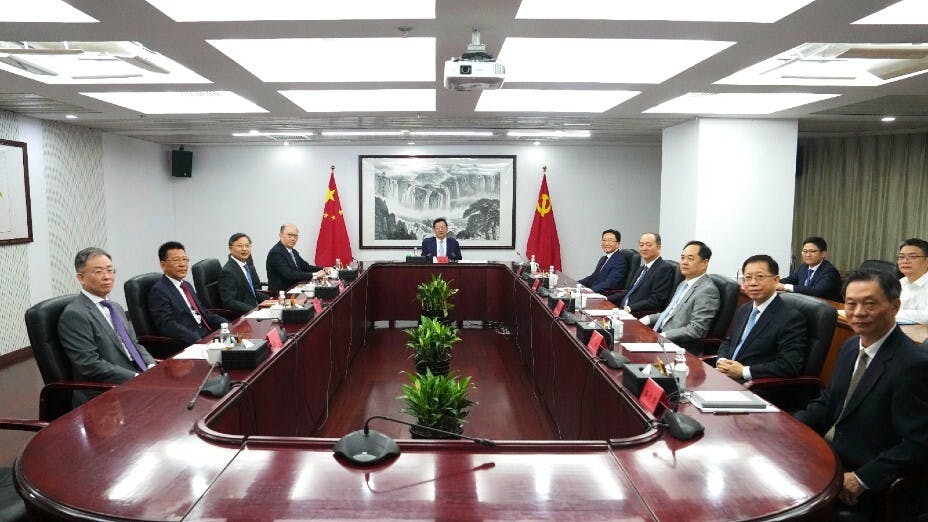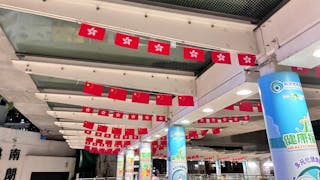中共中央港澳工作辦公室(港澳辦)已於2023年10月下旬完成重組工作,在網站上列出了10個局的主要職責。本文描述了港澳辦的新架構,並探討新架構對中央政府對香港和澳門特別行政區政策的重要影響。
10個局的主要職責
中共中央港澳辦的網站列出了以下職責:
一是貫徹執行「一國兩制」、「港人治港」、「澳人治澳」、高度自治方針,堅持依法治港治澳,執行憲法和《香港特别行政區基本法》、《 澳門特别行政區基本法》,落實「愛國者治港」、「愛國者治澳」原則,維護國家主權、安全、發展利益,促進港澳長期繁榮穩定。
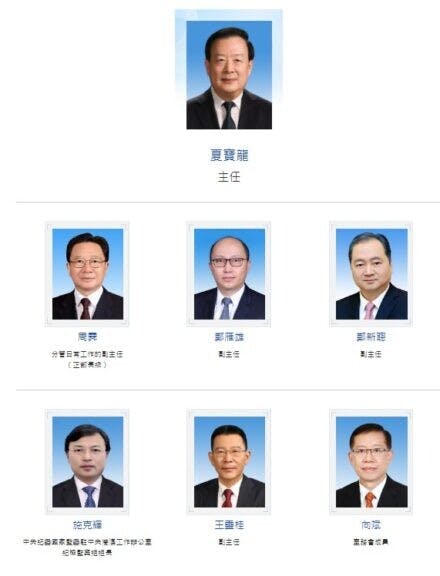
二是加強港澳工作的統籌協調、督促落實,組織開展對重大問題的調查研究,提出政策建議。
三是組織研究起草涉港澳有關法律法規草案並提出立法建議,就《基本法》等涉港澳重要法律實施涉及的相關法律問題研究提出意見。
四是支持特别行政區行政長官和特别行政區政府依法施政,推動建立完善特别行政區同憲法、《基本法》實施相關的制度和機制。
五是研究提出健全特别行政區行政長官對中央政府負責的制度、完善中央對特别行政區行政長官和主要官員的任免制度和機制的措施建議。
六是協調有關部門研究擬訂支持港澳發展經濟、保障民生福祉等方面的政策建議並推動落實。
七是組織落實特别行政區維護國家安全的法律制度和執行機制工作。
八是協調涉港澳宣傳工作,依法管理港澳新聞機構駐内地記者站和記者。
九是協助特别行政區加強憲法和《基本法》及國家安全法教育、國情教育、中國歷史和中華文化教育,增強港澳社會的國家意識和愛國精神。
十是負責内地與特别行政區政府和特區行政長官的官方交往和工作聯繫,協調推動有關部門和地方加強與港澳交流合作,指導和管理内地與港澳因公往來有關事務。對中央駐港澳機構提出的有關事宜提供意見、建議和工作協助。
一些香港傳媒將第二、三、五、六和八項界定為港澳辦的「新」職責。
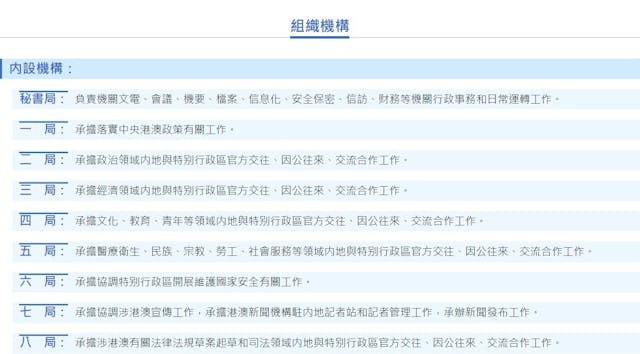
關鍵概念:全面管治權
分析來說,十項職責旨在體現中央對香港、澳門的「全面管治權」。 當「全面管治權」一詞首次出現在《一國兩制在香港特別行政區的實踐》白皮書時,理解這個概念真正含義的人不多。
然而,「全面管治權」的概念可以解釋為中國作為香港和澳門特別行政區的主權國家,特別是自《香港國安法》頒布以來,如何對兩個城市行使主權。自2020年6月下旬,以及最近在2023年5月修改《澳門維護國家安全法》以來(《澳門維護國家安全法》在2009年頒布), 維護中央政府的國家安全現已納入第一、二、三、四、七、九項主要職責。
第九項主要職責聚焦香港、澳門的教育方面,希望及要求加強國民教育、國家安全教育、中國歷史教育和中華文化教育。教育改革被視為向港澳居民灌輸更強烈的國家意識是必要的。從某種意義上說,2020年以來香港的教育改革,旨在強化香港人的國家認同和文化認同。
第四、五、六項主要職責環環相扣,一是支持兩個特別行政區的行政長官和政府;二是完善他們(包括主要官員)對中央政府負責的制度;三是落實促進經濟發展和保障民生的工作。這三項職責對中央政府極為重要,特別是考慮到2019年下半年香港的混亂局面,以及澳門在經濟多元化、擺脫對賭場和博彩驅動的經濟嚴重依賴方面進展緩慢。
從某種意義上來說,第八項主要職責特別之處在於,中央加強對港澳宣傳工作、港澳新聞機構駐内地記者站和記者的管理,顯示監督和協調工作力度有所加強。
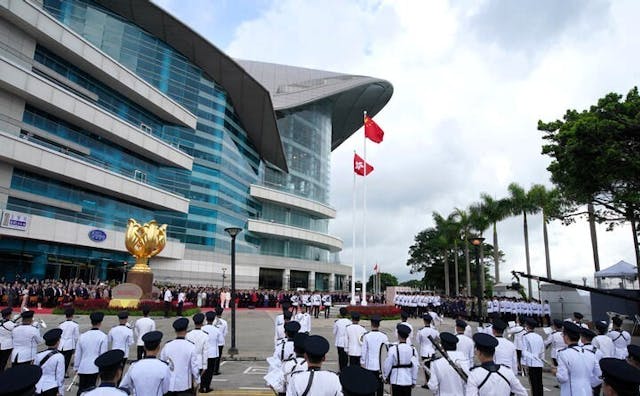
港澳辦八局 加強中央監督、指導和領導
港澳辦設有八個局,負責處理香港和澳門事務。秘書局負責處理機關文電、會議、機要、檔案、信息化、安全保密、信訪、财務等機關行政事務和日常運轉工作;一局負責承擔落實中央港澳政策有關工作;二局承擔政治領域内地與特别行政區官方交往、因公往來、交流合作工作; 三局承擔經濟領域内地與特别行政區官方交往、因公往來、交流合作工作;四局承擔文化、教育、青年等領域内地與特别行政區官方交往、因公往來、交流合作工作;五局承擔醫療衛生、民族、宗教、勞工、社會服務等領域内地與特别行政區官方交往、因公往來、交流合作工作;六局負責承擔協調特别行政區開展維護國家安全有關工作;七局負責協調涉港澳宣傳工作,承擔港澳新聞機構駐内地記者站和記者管理工作,承擔新聞發布工作; 八局負責涉港澳有關法律法規草案起草和司法領域内地與特别行政區官方交往、因公往來、交流合作工作。
從組織角度來看,這些局的重組和職責劃分,有利於港澳辦有效履行職責。 因此,港澳辦的改組,包括最近將其直屬中共中央的舉措,旨在加強中央對港澳辦的監督、指導和領導。最重要的是,黨國體制在組織上相互交織,使得黨國對港澳政策的執行、審查、改進和完善更加有效。「全面管治權」的概念現在已充分實現和確定,不僅是透過中央與港澳辦的環環相扣的關係,同時透過港澳辦內部的重組和改革來實現。
總之,港澳辦的重組可以被視為北京中央政府加強對港澳的「全面管治權」或主權的實現。這也可以理解為黨國對港澳的政策,特別是2020年年中之後,在實施和改革方面更加有效的最後階段。這也使得中央對兩個特別行政區行政長官及其政府的監督更加有效,同時完善了行政長官及其主要官員,以及兩個政府對中央政府負責的制度。
重組和釐清港澳辦的職責現在已經非常明確:國家安全貫穿了中央領導的港澳辦的主要職責,而兩個特別行政區則需要比以往更有組織、政策更連貫、更有效地處理國家安全教育、國民教育、中國歷史教育、中華文化教育、發展經濟和保障民生福祉。同樣,港澳辦八個局的職責劃分,也是為了更有效落實「一國兩制」、「港人治港」、「澳人治澳」和愛國者治港澳的原則。因此,港澳辦的最新重組,可以被視為北京實現對港澳「全面管治權」漫長過程的最終完成。
The new structure of HKMWO and its political implications
The reorganization of the Hong Kong Macau Work Office (HKMWO) under the Central Committee of the Communist Party of China (CPC) has been completed in late October 2023 by listing on its website not only the duties but also the responsibilities of ten bureaus. This article delineates the HKMWO’s new structure and examines its important implications for the central government’s policies toward Hong Kong and Macau special administrative regions.
The website of the HKMWO lists the following duties.
First, it implements the principles of “one country, two systems,” “Hong Kong people ruling Hong Kong,” and “Macau people ruling Macau,” their high degree of autonomy, the governance of Hong Kong and Macau in accordance with the law, the implementation of the Chinese constitution and the Basic Law of Hong Kong and Macau, “the patriots ruling Hong Kong and Macau,” the protection of the nation’s sovereignty, security and developmental interest, and the promotion of the long-term prosperity and stability of Hong Kong and Macau.
Second, it strengthens the unified planning and coordination, the supervision over implementation, the organization of study and surveys on important questions, and the issuance of policy suggestions.
Third, it organizes studies and makes suggestions on draft law, statutes and legislation relating to Hong Kong and Macau, and submits proposals on the implementation of important law and on related legal questions pertinent to Hong Kong and Macau.
Fourth, it supports the chief executives and the governments of the special administrative regions to implement policies in accordance with the law, and to promote the construction and perfection of the system and mechanisms related to the Chinese constitution and the Basic Law.
Fifth, it studies and makes proposals on the perfection of the accountability of the chief executives to the central government, the improvement of the approval system and mechanism on the appointment and removal of chief executives and principal officials.
Sixth, it coordinates the study of relevant departments on the support and development of Hong Kong and Macau’s economy, on the protection of the people’s livelihood and on other related policy measures.
Seventh, it organizes the implementation of the legal system and of protecting national security in the special administrative regions.
Eighth, it coordinates the propaganda work of Hong Kong and Macau and manages in accordance with law the media organizations, stations and reporters who are from Hong Kong and Macau and who are based in the mainland.
Ninth, it helps the special administrative regions to strengthen not only the education on the Chinese constitution, the Basic Law, and the national security law, but also national education, Chinese history, Chinese cultural spirits and the consolidation of the national consciousness and patriotic spirit of the societies of Hong Kong and Macau.
Tenth, it is responsible for the official interactions and work relations between the mainland and the chief executives and the governments of the special administrative regions, coordinates and promotes the cooperation between relevant departments in the mainland and Hong Kong and Macau, directs and manages the official affairs between the mainland and Hong Kong and Macau, and makes suggestions and provides assistance to the mainland organs that are stationed in Hong Kong and Macau.
Numbers 2, 3, 5, 6 and 8 have been mentioned by some Hong Kong media as the “new” duties delineated by the HKMWO.
Analytically speaking, the ten duties are aimed at realizing the central government’s “comprehensive jurisdiction” over Hong Kong and Macau. When the term “comprehensive jurisdiction” first appeared in the 2014 White Paper on the implementation of the Basic Law in Hong Kong, very few people understood what this concept really meant.
However, the concept of “comprehensive jurisdiction” can be interpreted as how China as the sovereign state of the special administrative regions of Hong Kong and Macau has been exercising its sovereignty over the two cities particularly since the promulgation of the national security law in Hong Kong in late June 2020, and since the recent amendment of the national security law of Macau in May 2023 (the Macau national security law was enacted in 2009). The protection of national security of the central government is now embedded in duties numbers 1, 2, 3, 4, 7 and 9.
Duty number 9 focuses on the educational aspects of Hong Kong and Macau, which are expected and required to strengthen national education, national security education, Chinese history education, and Chinese cultural education. Education reform is seen as necessary to instil a much stronger sense of Chinese consciousness among the citizens of Hong Kong and Macau. In a sense, the educational reforms in Hong Kong since 2020 have been aiming at strengthening the national and cultural identity of the Hong Kong people.
Duties numbers 4, 5 and 6 are closely intertwined, firstly supporting the chief executives and governments of the two special administrative regions, secondly enhancing their accountability (including principal officials) to the central government, and thirdly consolidating the work on the promotion of economic prosperity and the people’s livelihood. These three duties are extremely important to the central government, especially in view of the chaos in Hong Kong during the latter half of 2019 and in view of the sluggishness of Macau in diversifying its economy away from its heavy dependence on the casino-driven and gaming-driven economy.
Duty number 8 is unique in the sense that the central government enhances publicity and propaganda work on the media organizations, stations and personnel from Hong Kong and Macau, pointing to stronger supervision and coordination work than ever before.
There are eight bureaus within the HKMWO in dealing with Hong Kong and Macau. A secretariat is dealing with minutes of meetings, documents, security issues, visits, and financial matters. Bureau 1 is responsible for implementing the central government’s policies on Hong Kong and Macau. Bureau 2 is dealing with the official interactions and collaboration in the political areas between the mainland and Hong Kong/Macau. Bureau 3 is coping with the official interactions and collaboration in the economic areas between the mainland and Hong Kong/Macau. Bureau 4 is focusing on the cultural, education and youth interactions between the mainland and Hong Kong/Macau. Bureau 5 is coping with public health, nationality affairs religions, labour and social service interactions between the mainland and Hong Kong/Macau. Bureau 6 is focusing on the coordination work with the two special administrative regions on the protection of national security. Bureau 7 is dealing with the publicity, propaganda work and liaison work on Hong Kong and Macau reporters and media organizations stationed in the mainland. Bureau 8 is specifically responsible for the drafting of law and legislation and judicial areas relating to the interactions between the mainland and Hong Kong/Macau.
From an organizational perspective, the restructuring of these bureaus and the delineations of their duties and responsibilities can help the implementation of the duties of the HKMWO effectively. As such, the restructuring of the HKMWO, including the recent move of bringing it directly under the Party, aims at strengthening the Party supervision, direction, and leadership of the HKMWO. Most importantly, the Party-state structures are now organizationally interwoven, making the Party-state’s policies on Hong Kong and Macau more effective in their implementation, review, improvement, and perfection. The concept of “comprehensive jurisdiction” is now fully realized and finalized through not only the interlocking relations between the Party and the HKMWO, but also the internal restructuring and reforms of the HKMWO.
In conclusion, the restructuring of the HKMWO can be seen as the realization of how the central government in Beijing enhances its “comprehensive jurisdiction” or sovereignty over Hong Kong and Macau. It can also be interpreted as the final stage of making the Party-state’s policies over Hong Kong and Macau, especially after mid-2020, far more effective in their implementation and reforms. It also makes the central authorities’ supervision over the chief executives and their governments of the two special administrative regions far more effective, while enhancing the accountability of the chief executives and their principal officials as well as the two governments to the central Party-state.
The reorganization and reclarification of the duties of the HKMWO are now very clear: while national security cuts through the essential duties of the Party-led HKMWO, the two special administrative regions are required to deal with national security education, national education, Chinese history education, Chinese cultural education, economic prosperity, and the people’s livelihood in a far more organized, coherent and effective manner than ever before. Similarly, the delineation of the duties of the eight bureaus within the HKMWO aim at making the implementation of the principles of “one country, two systems,” “Hong Kong people ruling Hong Kong,” “Macau people ruling Macau” and the patriots ruling the two special administrative regions far more effective than before. As such, the most recent restructuring of the HKMWO can be regarded as the finalization of the long process of realizing Beijing’s “comprehensive jurisdiction” over Hong Kong and Macau.
原刊於澳門新聞通訊社(MNA)網站,本社獲作者授權轉載。原文網址:
https://www.macaubusiness.com/opinion-the-new-structure-of-hkmwo-and-its-political-implications/



